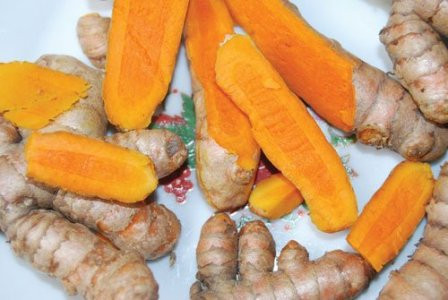Turmeric is an antioxidant.
According to oriental medicine, turmeric is bitter, spicy, aromatic, pungent, warm, clears menstruation, relieves pain, reduces pus, stimulates new skin, clears the liver and gallbladder, and destroys blood cholesterol.
Turmeric is a plant of the ginger family (Zingiberaceae). Turmeric contains 4%-6% light yellow, aromatic essential oil (up to 2.24% in fresh turmeric) with components including 25% terpenic carbur, zingiberen and 65% sesquiterpenic ketone, turmeron, arturmeron; in addition, there are curcuminoids, including curcumin (0.3%-1.5%) desmethoxycurcumin.

When researchers tested mice with breast cancer, they found that curcumin inhibited the growth of a protein that plays a key role in the formation and spread of metastatic tumors. Curcumin has also been shown to be effective in preventing Alzheimer’s disease.
Oriental medicine believes that turmeric has a bitter, spicy, aromatic, acrid taste, and a warm nature. It clears the meridians, relieves pain, reduces pus, stimulates new skin, clears the liver and gallbladder, and destroys blood cholesterol. Turmeric essential oil is antifungal and antibacterial.
Until now, turmeric is still a good spice, and at the same time a medicine that is effective in treating many diseases. For centuries, people have often used turmeric as an antiseptic for wounds, burns, bruises and as a beauty remedy for women, especially after giving birth, to heal wounds. Turmeric is also used to treat allergic rhinitis and sinusitis.
However, turmeric should not be overused. Turmeric should be used in moderation, only about 300-500g/day. Although turmeric is a fairly safe medicine, if used indiscriminately it can cause stomachache and diarrhea. If you need to use turmeric tablets or capsules as a health supplement, you should consult a doctor.
According to Laborer - NT






